13 Benefits Of Cottage Cheese, Nutrition, & How To Make It
Learn all about this yummy dairy product and how it can help in improving your health.
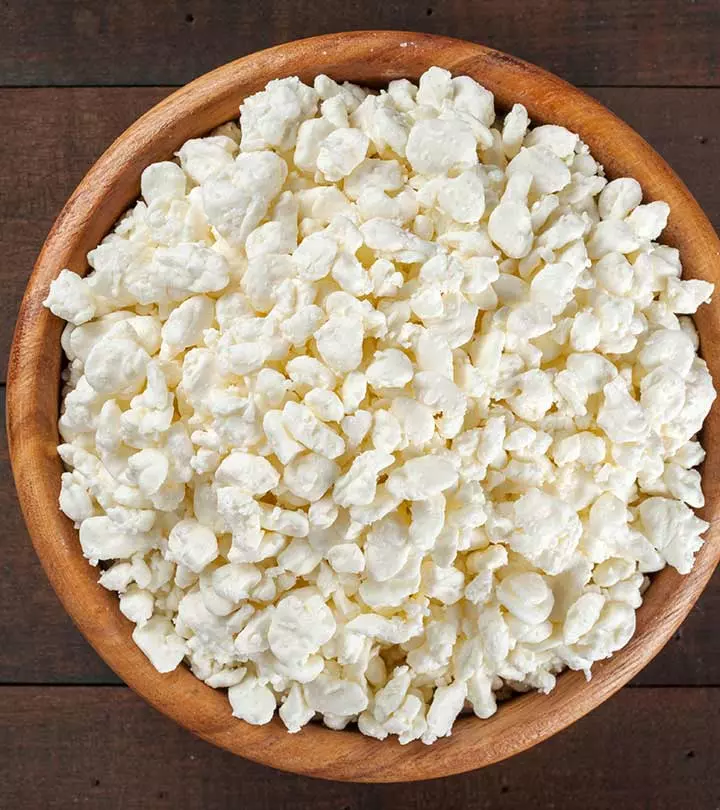
Image: Shutterstock
Cottage cheese benefits extend beyond its taste. The cheese is often referred to as the perfect low-fat cheese. Cottage cheese has a creamy texture and a salty taste. It is packed with proteins, riboflavin, vitamin B12, calcium, sodium, and other beneficial compounds. The benefits include boosting immunity, gut, heart, and bone health. Those interested in bodybuilding, in particular, may find it beneficial. This article discusses the importance of cottage cheese, its benefits, nutritional profile, and possible side effects. Take a look.
 Know Your Ingredient: Cottage Cheese
Know Your Ingredient: Cottage CheeseWhat Is It?
A soft, white, mildly acidic and creamy cheese that is made by curdling milk.
What Are Its Benefits?
It aids muscle gain and weight loss, strengthens bones, and improves vision.
Who Can Consume It?
All except those who are lactose intolerant.
How Often?
Up to 25 g every day.
Caution
Avoid consuming it if you are lactose intolerant.
In This Article
How Is Cottage Cheese Good For You?
Cottage cheese is an excellent source of essential vitamins and nutrients. This nutritious dairy product is abundant in calcium that helps promote strong bones and prevents osteoporosis. The B complex vitamins provide a natural energy boost, while vitamin A supports optimal eye health. In addition, with its low-calorie content and high protein values, this can be a valuable addition to a weight loss diet.
It is enjoyed worldwide with various regions having their own version of cottage cheese with slight differences in taste and texture. Some popular types are the Indian paneer, American whipped cottage cheese, German quark, and Russian tvarog.
Cottage cheese is an excellent source of calcium, B complex vitamins, and vitamin A – all of these contribute to its goodness.
The calcium in the cheese can build bone strength and prevent osteoporosis. The B vitamins give energy, and vitamin A does good to your eyes. Well, there’s more to cottage cheese that we need to know.
Key Takeaways
- Cottage cheese may help improve heart health due to its high potassium content.
- The calcium in cottage cheese is beneficial for muscle building and preventing osteoporosis.
- It also contains probiotic bacteria that help improve gut health.
- In addition, this cheese aids diabetes treatment and weight loss, improves digestive health, and strengthens bones.
What Are The Benefits Of Cottage Cheese?
 Trivia
Trivia1. May Help Fight Cancer
Cottage cheese is used in the popular Budwig Diet, which is one of the best diets for cancer.
The diet primarily includes cottage cheese and flaxseed oil and is known to aid cancer treatment.
Cottage cheese is replete with sulfur protein, some healthy saturated fats, and other important nutrients like B vitamins, phosphorus, calcium, and selenium (1). Fermented products like cottage cheese also offer the beneficial probiotic bacteria, which are known to prevent digestive cancers (2).
The Budwig diet has been found to counter breast cancer as well (3). Other studies also show how the diet had increased mortality among women already battling breast cancer.
 Did You Know?
Did You Know?2. May Aid Diabetes Treatment
As per the American Diabetes Association, cottage cheese is the best cheese choice one can make. And low-fat cottage cheese is preferable. Cottage cheese is one good source of protein, a nutrient all the more essential for diabetics.
It is also a brilliant source of calcium and vitamin D – which is a potent combination for treating diabetes. Studies have shown that women consuming adequate levels of calcium and vitamin D (1,200 mg and 800 IU respectively) daily were 33% less likely to suffer from diabetes (4).
3. Strengthens Bones

The abundance of calcium keeps cottage cheese quite high on the list of must-haves for bone health. This is another reason it can also aid osteoporosis treatment. And apart from calcium, the cheese also boosts your phosphorus intake. Both the minerals make up hydroxyapatite – which is a mineral that contributes to bone density. Several studies show how the lack of both calcium and phosphorus can be detrimental to the bones (5).
4. May Boost Digestive Health
The calcium in cottage cheese, surprisingly, can reduce heartburn and prevent an upset stomach
. And cottage cheese is one good source of probiotics – which is known to boost digestion and prevent other related issues like constipation and irritable bowel syndrome (6).
But the digestive benefits of cottage cheese may not apply to people who are lactose intolerant. If you are lactose intolerant, we recommend you stay away from cottage cheese and consult your doctor.
5. May Cut Risk Of Heart Disease
Cottage cheese contains vitamin B12, which is one nutrient known to reduce excess levels of homocysteine. Excessive homocysteine can cause heart problems and other neurological issues, which cottage cheese might prevent.
Cottage cheese is also naturally low in fat, which is another reason it might be good for heart health (7).
However, more studies are required in this regard. Please consult your doctor before using cottage cheese for this purpose.
6. Can Help In Bodybuilding

Cottage cheese is a steady source of muscle-building protein (one cup contains 27 grams of the nutrient). More importantly, the cheese contains casein protein – which gets digested slowly and offers your body a steady supply of important amino acids.
And the riboflavin in the cheese helps metabolize protein. It boosts bone health, which is especially important for bodybuilders. Eating cottage cheese before going to bed is one good way to get the protein your muscles need.
The cheese also helps prevent muscle cramps, thanks to its natural sodium content. Sodium helps maintain normal body-fluid balance and even works with other electrolytes to improve muscle contractions.
7. Can Aid Weight Loss
The protein in cottage cheese can keep you full and provide you with a feeling of satiety, and this means you eat less, which means you have a chance of shedding some pounds in a healthy manner. Some research also suggests that calcium (which cottage cheese is rich in) from dairy foods can stimulate fat-burning and suppress fat accumulation – ultimately helping in weight loss (8).
Cottage cheese is also known for its low calorie content. This is another plus if you want to lose weight. You can add it to salads, mix it into smoothies, or use it as a topping for fruits or whole-grain crackers. Its creamy texture makes it a satisfying snack without adding too many calories.
8. May Boost Immunity
Though there is very less research on this, some sources link the immune-boosting properties of cottage cheese to its magnesium content (9). Magnesium activates various bodily enzymes and supports immunity.
9. Can Aid Detoxification
The phosphorus in cottage cheese plays a role here. As per research, phosphorus is the second most abundant mineral in the body, and it works great in eliminating waste. And the probiotics in the cheese repopulate the bowels with healthy bacteria, thereby aiding detoxification.
 Did You Know?
Did You Know?10. Helps Delay Aging

In some ways, cottage cheese can delay the signs of aging and boost skin and hair health. The cheese is a good source of selenium, which fights flaky skin and dandruff (4). Also, the vitamin E and other antioxidants in the cheese fight free radicals and give you healthier skin.
Your skin also needs the amino acid proline to produce collagen. Cottage cheese is a good source of proline, and hence, it aids collagen production.
11. May Improve Vision
Some research says that increasing our vitamin A and zinc intake can cut the risk of vision loss. Cottage cheese contains both these nutrients and can hence play an important role in protecting your vision.
However, more studies are needed to substantiate this.
12. May Benefit Pregnant Women
Cottage cheese is rich in protein, vitamin B12, dietary calcium, and phosphorus – all of which are required for pregnant women. But ensure the cheese is made of pasteurized milk as the unpasteurized version contains harmful bacteria that can cause miscarriage in pregnant women (10).
13. Supports Keto Diet
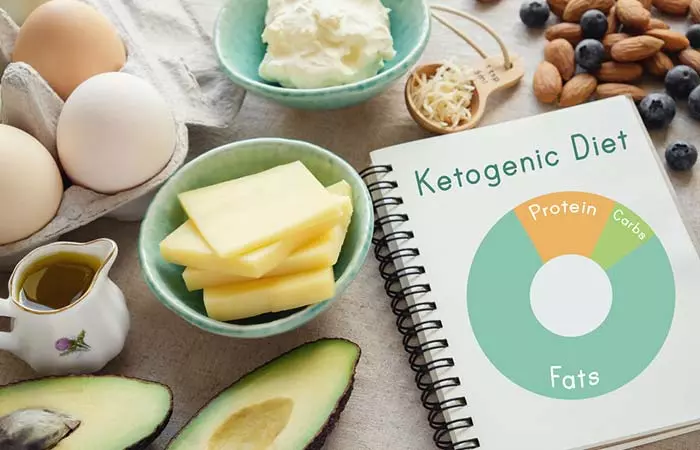
If you are on a keto diet, full-fat dairy choices are a big YES. As the name suggests, the keto diet is all about achieving ketosis – which is the phenomenon where your body uses up fat for energy instead of glycogen or carbs. This process works great for weight loss and also cuts the risk of several diseases (11).
We have seen the benefits of cottage cheese. These could have been quite unexpected, given the negative picture our societies have painted towards cheese and other dairy products. But cottage cheese does have its own benefits, and it’s time we started realizing them.
 Quick Tip
Quick TipA fitness YouTuber said he ate cottage cheese every day because its casein protein digests slower. He explained, “I like it because if you take it right before going to bed, then it kind of makes me feel like I’m eating cottage cheese right before bedtime and because it digests so slow, I’m still feeding my muscles and they’re not going catabolic yet (i).”
Which takes us to the next section – the nutrients in cottage cheese that make it what it is.
What Is The Nutritional Profile Of Cottage Cheese?
Nutrition FactsServing Size 226g | ||
|---|---|---|
| Amount Per Serving | ||
| Calories 163 | Calories from Fat 20 | |
| % Daily Value | ||
| Total Fat 2g | 4% | |
| saturated Fat 1g | 7% | |
| Trans Fat | ||
| Cholesterol 9mg | 3% | |
| Sodium 918mg | 38% | |
| Total Carbohydrate 6g | 2% | |
| dietary Fiber 0g | 0% | |
| Sugars 6g | ||
| Protein 28g | ||
| Vitamin A | 2% | |
| Vitamin C | 0% | |
| Calcium | 14% | |
| Iron | 2% | |
| Calorie Information | ||
| Amounts Per Selected Serving | %DV | |
| Calories | 163(682 kJ) | 8% |
| From Carbohydrate | 22.9(95.9 kJ) | |
| From Fat | 20.3(85.0 kJ) | |
| From Protein | 120(502 kJ) | |
| From Alcohol | 0.0(0.0 kJ) | |
| Protein & Amino Acids | ||
| Amounts Per Selected Serving | %DV | |
| Protein | 28.0g | 56% |
| Vitamins | ||
| Amounts Per Selected Serving | %DV | |
| Vitamin A | 92.7IU | 2% |
| Vitamin C | 0.0mg | 0% |
| Vitamin D | – | – |
| Vitamin E (Alpha Tocopherol) | 0.0mg | 0% |
| Vitamin K | 0.2mcg | 0% |
| Thiamin | 0.0mg | 3% |
| Riboflavin | 0.4mg | 22% |
| Niacin | 0.3mg | 1% |
| Vitamin B6 | 0.2mg | 8% |
| Folate | 27.1mcg | 7% |
| Vitamin B12 | 1.4mcg | 24% |
| antothenic Acid | 0.5mg | 5% |
| Choline | 39.5mg | |
| Betaine | – | |
| Minerals | ||
| Amounts Per Selected Serving | %DV | |
| Calcium | 138mg | 14% |
| Iron | 0.3mg | 2% |
| Magnesium | 11.3mg | 3% |
| Phosphorus | 303mg | 30% |
| Potassium | 194mg | 6% |
| Sodium | 918mg | 38% |
| Zinc | 0.9mg | 6% |
| Copper | 0.1mg | 3% |
| Manganese | 0.0mg | 0% |
| Selenium | 20.3mcg | 29% |
| Fluoride | 71.4mcg | |
Since there are many varieties of cottage cheese, it is best to contrast and compare the nutrition profile of each type to understand their suitability for your diet requirements. For instance, paneer nutrition facts stand in contrast with tvarog nutrition due to the distinct types of milk and methods used. Another important global debate when it comes to types of curdled dairy products is – is Greek yogurt better than cottage cheese? Can it be a good substitute? Find out more in the following section.
Cottage Cheese Vs. Greek Yogurt
Cottage cheese is higher in calories, but it also contains a higher amount of protein. And though low-fat Greek yogurt has less fat, it contains comparatively less protein.
And talking about carbs, both fare the same. While cottage cheese contains a lot of sodium (around 800 milligrams per cup), Greek yogurt contains just about 65. Coming to sugar, Greek yogurt has more of it – so cottage cheese could be a better option for someone trying to avoid sugar.
But talking about probiotics, Greek yogurt enjoys the upper hand. And this makes Greek yogurt far easier to be digested as compared to cottage cheese.
And in case you are wondering if you should always purchase cottage cheese from the market, we have good news for you.
How To Make Cottage Cheese At Home
A simple process. And all you need is raw milk. You can take half a gallon of raw milk and some salt (for taste).
Here’s what you need to do:
- Skim the cream off the milk and store in a mason jar in the fridge for later use.
- Pour the skimmed milk into a glass bowl and cover with a cheesecloth. Leave it as it is for a couple of days until it gathers a jello-like consistency. No watery whey sitting on the top.
- Skim off any leftover cream, and dump the thickened milk into a large pot. Put it on low heat for about 10 minutes until you see the milk separate into curds and whey.
- Pour the curds and whey into a strainer, a butter muslin cloth (and into another bowl), and allow to drain for about 2 to 3 hours.
- Remove the curds from the butter muslin cloth and add them to another bowl. Crumble them into small chunks. Add salt. You can now pour the leftover cream that you had saved earlier, and mix well. Stir. Your homemade cottage cheese is ready!
Now that you know how to make cottage cheese at home, it is the perfect time to start adding this nutritious ingredient to your meals in new and exciting ways. Scroll down to know more.
How To Include Cottage Cheese In Daily Meals
Here are a few ways in which you can make cottage cheese a part of your daily diet:
- Mix cottage cheese, granola, fresh fruit (such as berries), and a sprinkle of honey or maple syrup for a delicious and healthy breakfast bowl.
- Blend cottage cheese with fruits, a little milk, and some spinach or oats for a protein-rich smoothie.
- Incorporate cottage cheese into your salad alongside mixed greens, spinach, or arugula, in place of a creamy dressing.
- Spread or stuff sandwiches or wraps with cottage cheese for a creamy texture.
- Pair cottage cheese with your favorite fruits, like strawberries, peaches, or pineapples for a quick snack.
- Combine blended cottage cheese with herbs such as garlic, parsley, dill, and a small pinch of salt and pepper for a savory dip.
- Incorporate cottage cheese into the batter when making protein-rich pancakes to achieve a fluffier texture.
You can prepare a variety of savory and sweet dishes with your homemade cottage cheese! Check out a couple of recipes for you to try below.
Cottage Cheese Recipes
1. Cottage Cheese Herb DipIngredients
Ingredients
- 1 cup of cottage cheese
- ¼ cup of fresh parsley and dill, finely chopped
- 1 teaspoon of lemon juice
- 1 teaspoon of salt
- 1 teaspoon of pepper
How To Prepare
- Add cottage cheese, fresh herbs, lemon juice, salt, and pepper to a food processor and blend until smooth.
- Serve with crackers or bread.
2. Cottage Cheese PancakesIngredients
Ingredients
- 1 cup of cottage cheese
- 2 eggs
- ¼ cup of whole wheat flour
- 2 tablespoons of sugar
- ½ teaspoon of vanilla extract
How To Prepare
- Blend together cottage cheese, eggs, flour, sugar, and vanilla extract to form a smooth paste.
- Heat a non-stick skillet over medium heat and grease it with butter.
- Pour small amounts of the batter on it and cook on both sides until golden brown.
3. Cottage Cheese Salad
Ingredients
- 1 cup cottage cheese
- 1 chopped cucumber
- 1 chopped tomato
- 1/4 thinly sliced red onion
- A handful of chopped fresh parsley or cilantro
- 1 tablespoon of olive oil
- 1 tablespoon of lemon juice
- Salt and pepper to taste
How To Prepare
- Combine the cottage cheese, cucumber, tomato, and red onion in a large bowl.
- Drizzle with olive oil and lemon juice, and toss to mix everything.
- Season with salt and pepper to taste.
- Garnish with chopped parsley or cilantro.
- Serve immediately as a refreshing snack or light lunch.
Infographic: Benefits Of Cottage Cheese
Cottage cheese is known for its creamy taste and low calorific value. It is a part of various cuisines worldwide because the nutrients in cottage cheese can help promote overall health.
The following infographic elucidates the major benefits of cottage cheese. Check it out! Illustration: StyleCraze Design Team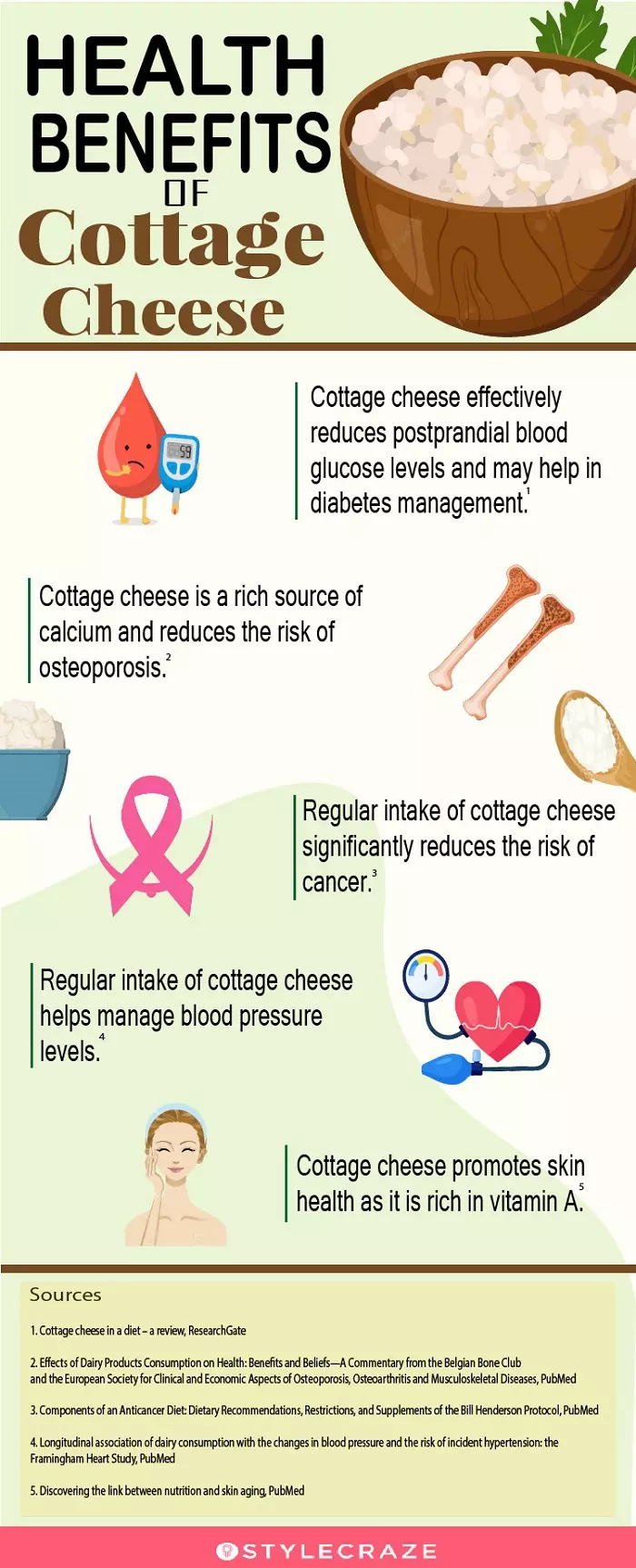
The benefits of cottage cheese are many and can be attributed to its nutrients. Cottage cheese can reduce the risk of cancer, aid in diabetes treatment, and boost digestive health. In addition, the calcium in cottage cheese can strengthen bones. Cottage cheese also reduces the risk of heart disease and boosts immunity. It also aids in weight loss, helps in detoxification, and delays the signs of aging. Cottage cheese is beneficial for pregnant women too. You can also prepare cottage cheese at home. Try including this nutrient-dense cheese as a part of your diet to reap its benefits.
Frequently Asked Questions
What are some healthy ways to eat cottage cheese?
There are several ways you can incorporate cottage cheese into your diet in a healthy manner:
- Have it with your fruit salad.
- Add it to smoothies.
- Add it to pancake batter to make cottage cheese pancakes.
- Stir it into a pasta.
How much cottage cheese can you eat in a day?
The recommended daily amounts vary from 25 grams to as much as a bowl. We suggest you talk to your health care provider for the right dosage for you.
What are the side effects of excess cottage cheese?
As the cheese is a great source of protein, consuming it along with other protein-rich sources can lead to excess protein intake – ultimately resulting in stress on the kidneys and issues with the organs.
Also, if you have lactose intolerance, having cottage cheese can lead to allergic reactions and gastrointestinal problems.
And given the high amounts of sodium, excess intake of cottage cheese can lead to hypertension, which is not good for the heart as well.
How long does cottage cheese last?
If kept in the refrigerator, it lasts for 5 to 7 days. In the freezer, cottage cheese can last up to 3 months.
Can we feed cottage cheese to dogs?
Yes. The calcium and protein in the cheese can be beneficial for your dog. But avoid it in case it develops digestive issues.
What is a good substitute for cottage cheese?
Plain Greek yogurt can act as a good substitute. Even ricotta cheese or sour cream can do the trick.
What mixes well with cottage cheese?
Cottage cheese is a versatile ingredient that mixes well with both savory flavors and fruits, such as bananas, pineapples, and berries. Olive oil, pinenuts, and basil also make for a healthy snack with it.
Is cottage cheese inflammatory?
No. However, its consumption may cause inflammation if you are allergic to casein.
Does cottage cheese boost metabolism?
A 2014 study confirms that consumption of casein before sleep may boost next-morning metabolism in young men (12).
Can cottage cheese cause gas?
No, it is good for digestive health. However, its consumption may cause bloating and gas if you are lactose intolerant.
Illustration: Benefits Of Cottage Cheese Nutrition & How To Make It
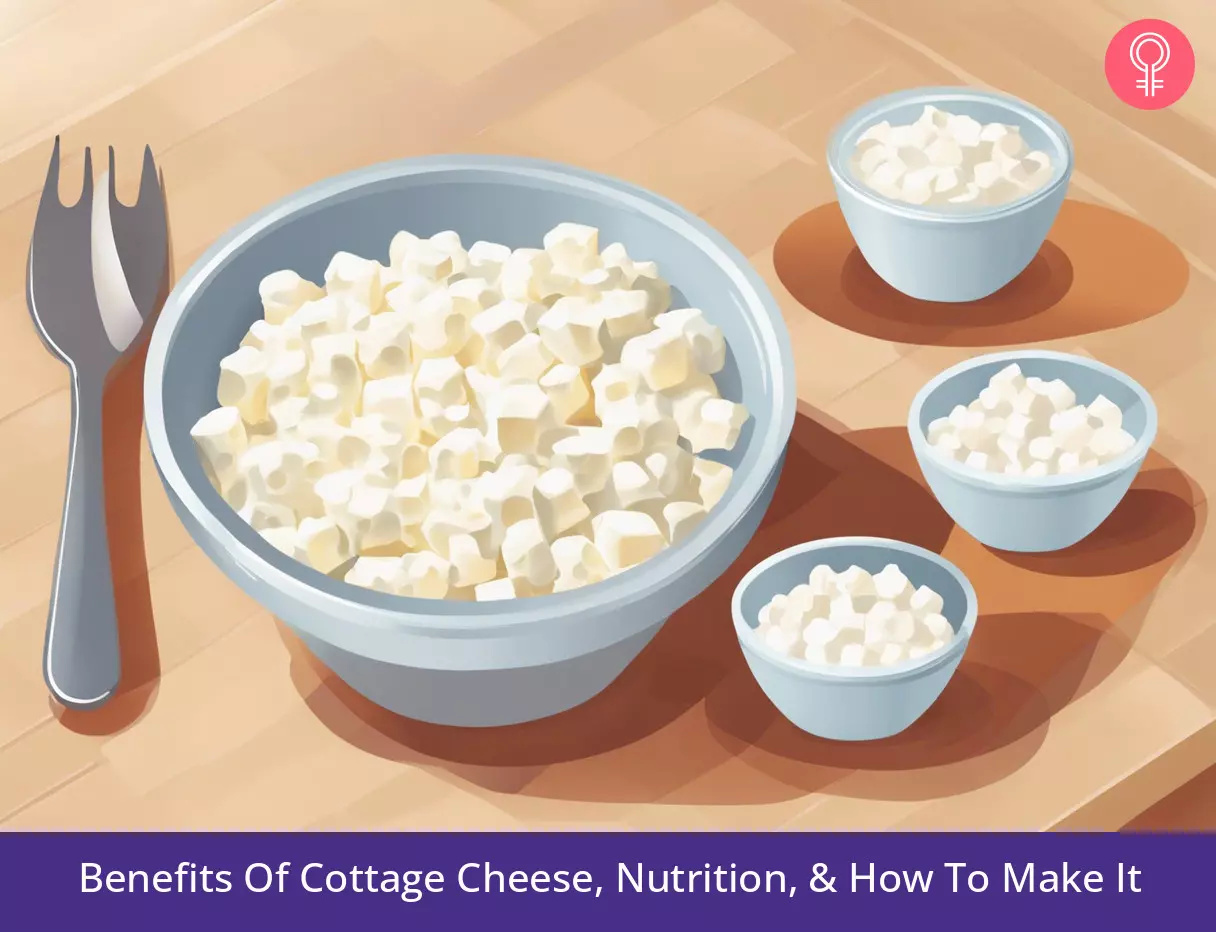
Image: Stable Diffusion/StyleCraze Design Team
Learn about the amazing health benefits and nutrient facts of cottage cheese! Discover why it’s a great addition to your diet. Look at the video given below.
Personal Experience: Source
StyleCraze's articles are interwoven with authentic personal narratives that provide depth and resonance to our content. Below are the sources of the personal accounts referenced in this article.
i. 4 reasons I love Cottage Cheese
https://www.youtube.com/watch?v=ekQWnpsvO70
References
Articles on StyleCraze are backed by verified information from peer-reviewed and academic research papers, reputed organizations, research institutions, and medical associations to ensure accuracy and relevance. Read our editorial policy to learn more.
Articles on StyleCraze are backed by verified information from peer-reviewed and academic research papers, reputed organizations, research institutions, and medical associations to ensure accuracy and relevance. Read our editorial policy to learn more.
- Cheese, cottage, lowfat, 2% milkfat
https://fdc.nal.usda.gov/food-details/328841/nutrients - Association Between Dairy Product Consumption and Colorectal Cancer Risk in Adults: A Systematic Review and Meta-Analysis of Epidemiologic Studies
https://pmc.ncbi.nlm.nih.gov/articles/PMC6518136/ - Flaxseed sprouts induce apoptosis and inhibit growth in MCF-7 and MDA-MB-231 human breast cancer cells
https://pubmed.ncbi.nlm.nih.gov/22438134/ - Vitamin D and calcium intake in relation to type 2 diabetes in women
https://pubmed.ncbi.nlm.nih.gov/16505521/ - Calcium and phosphate: a duet of ions playing for bone health
https://pubmed.ncbi.nlm.nih.gov/22081690/ - Influence of probiotic strains added to cottage cheese on generation of potentially antioxidant peptides, anti-listerial activity, and survival of probiotic microorganisms in simulated gastrointestinal conditions
https://www.sciencedirect.com/science/article/abs/pii/S0958694613001179 - 7 cheese facts that will surprise you
https://www.bhf.org.uk/informationsupport/heart-matters-magazine/nutrition/cheese - Role of calcium and dairy products in energy partitioning and weight management
https://pubmed.ncbi.nlm.nih.gov/15113738/ - Therapeutic potential of popular fermented dairy products and its benefits on human health
https://pmc.ncbi.nlm.nih.gov/articles/PMC10933135/ - Unpasteurised milk consumption as a potential risk factor for toxoplasmosis in females with recurrent pregnancy loss
https://pubmed.ncbi.nlm.nih.gov/32013639/ - Very-low-carbohydrate ketogenic diet v. low-fat diet for long-term weight loss: a meta-analysis of randomised controlled trials
https://pubmed.ncbi.nlm.nih.gov/23651522/ - Night-time consumption of protein or carbohydrate results in increased morning resting energy expenditure in active college-aged men
https://pubmed.ncbi.nlm.nih.gov/23768612/
Read full bio of Ravi Teja Tadimalla
Read full bio of Arshiya Syeda
Read full bio of Sindhu Koganti





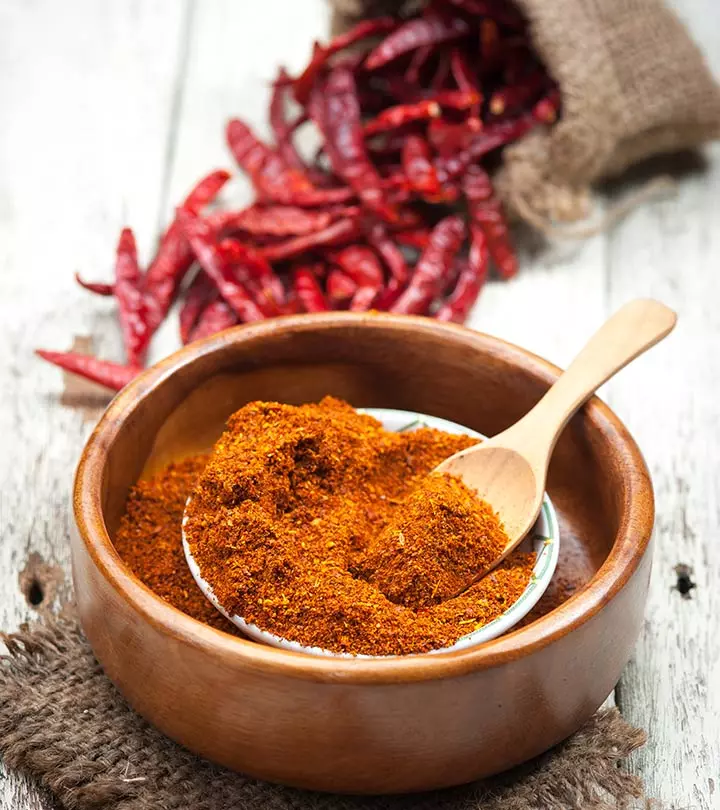
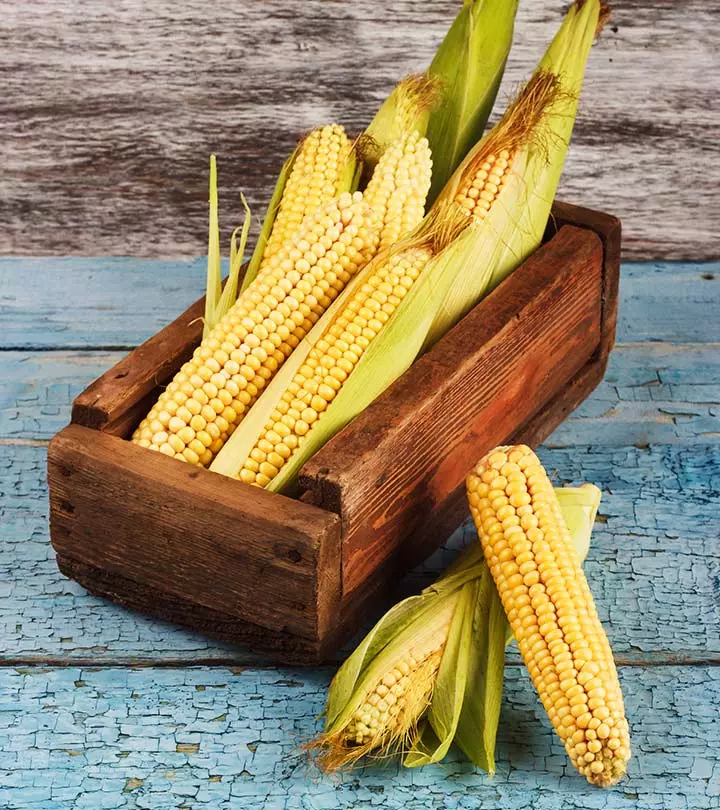

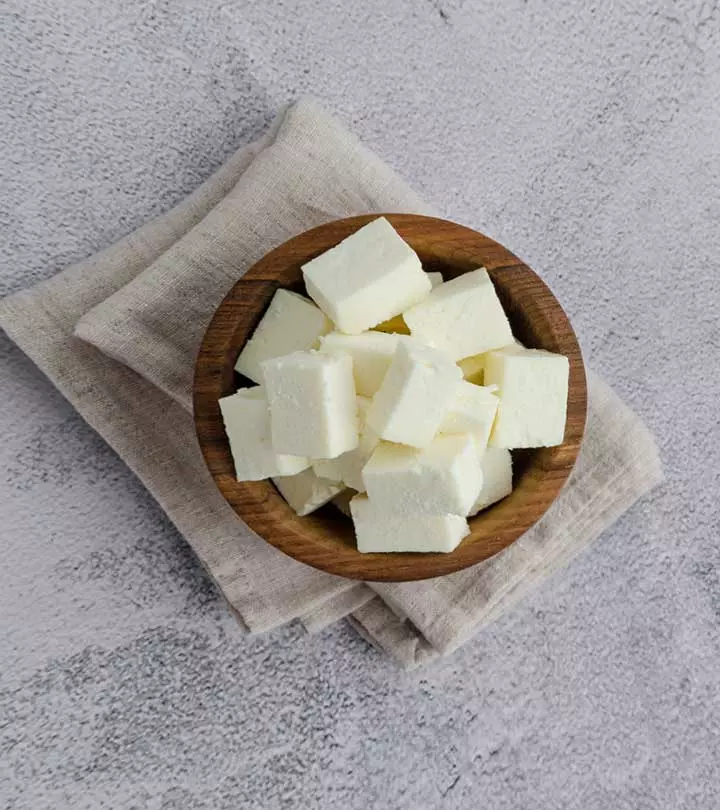
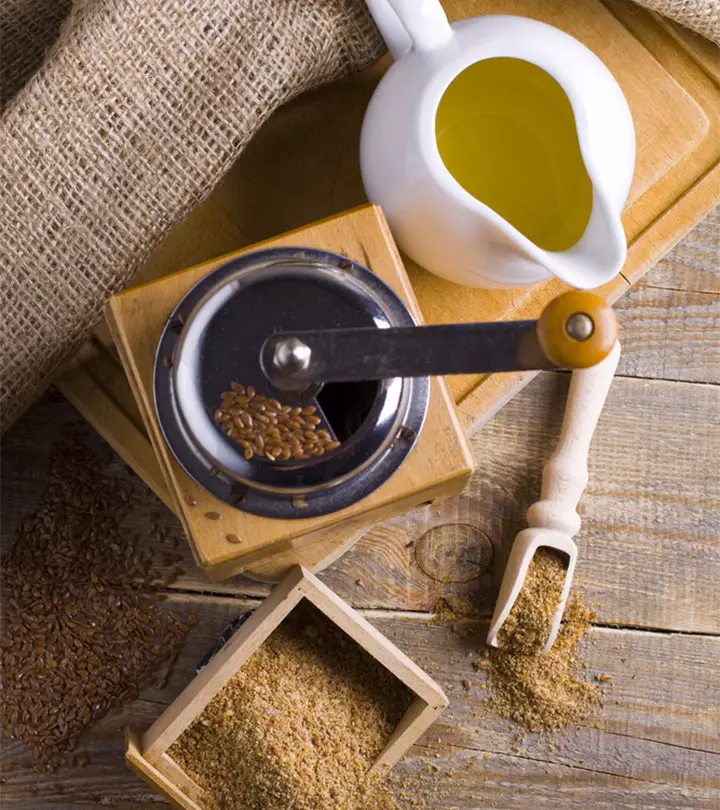
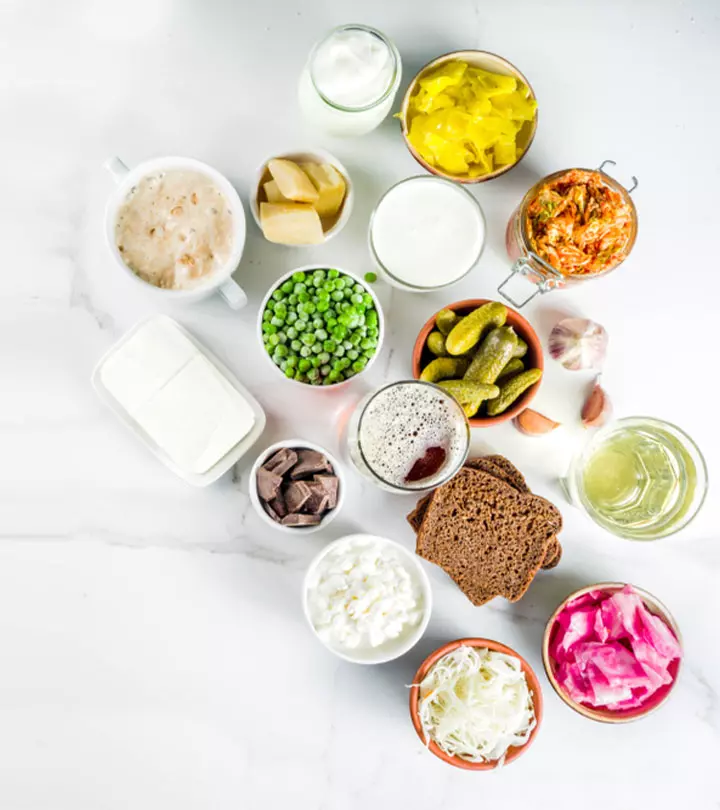
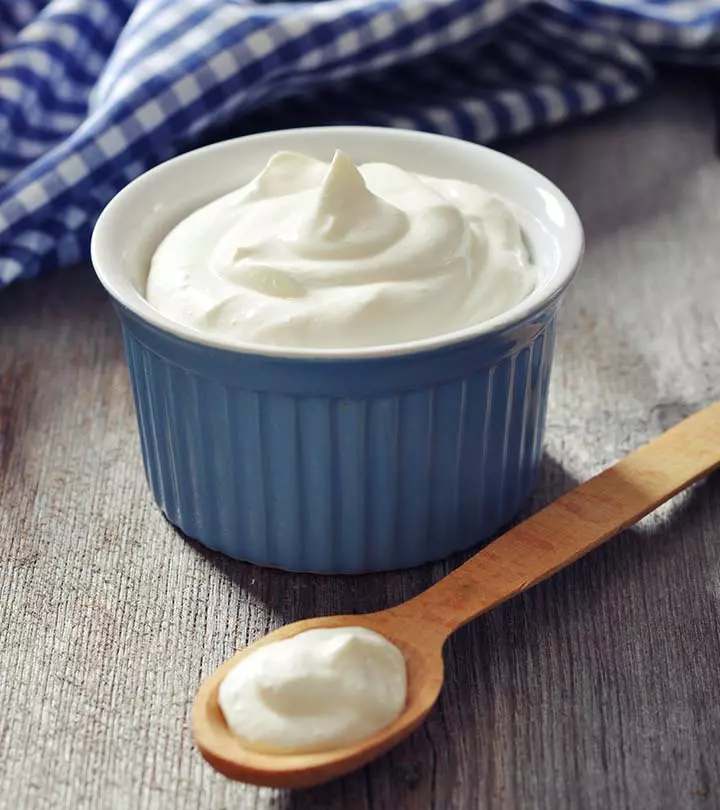
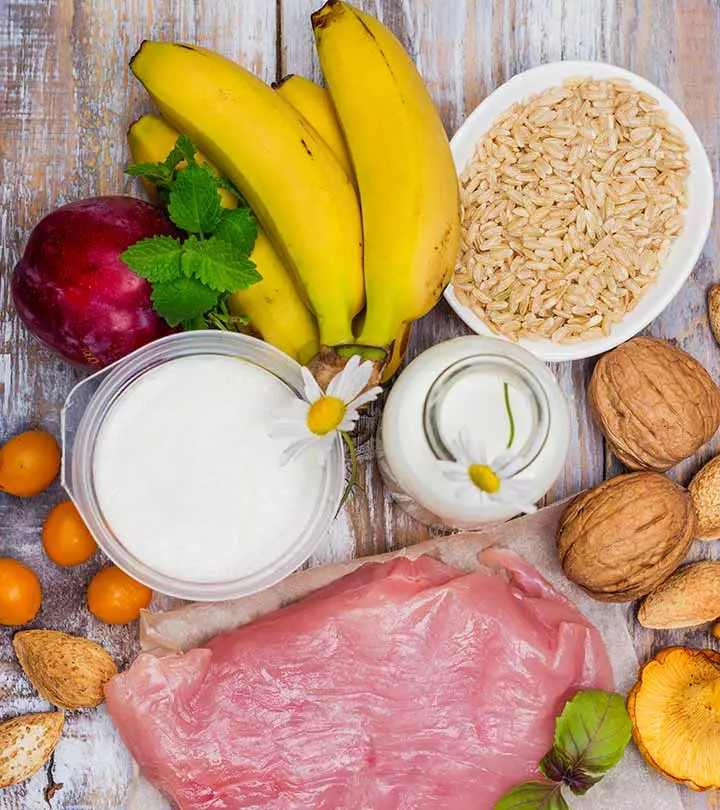
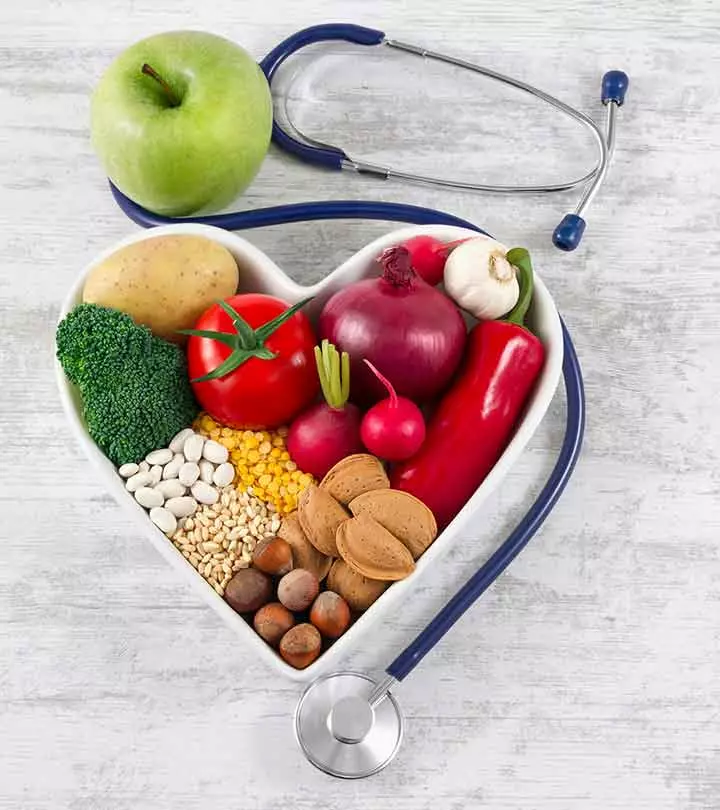

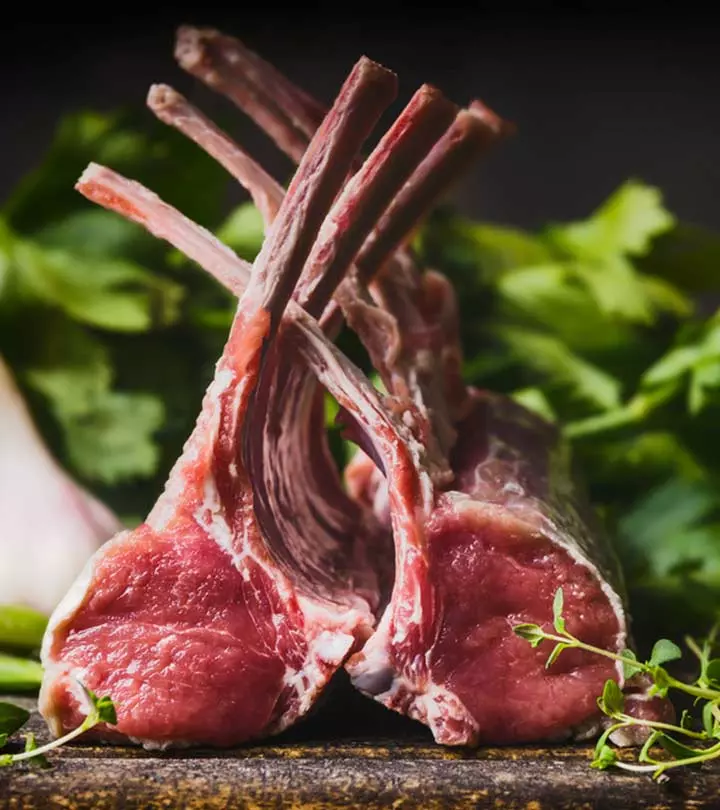
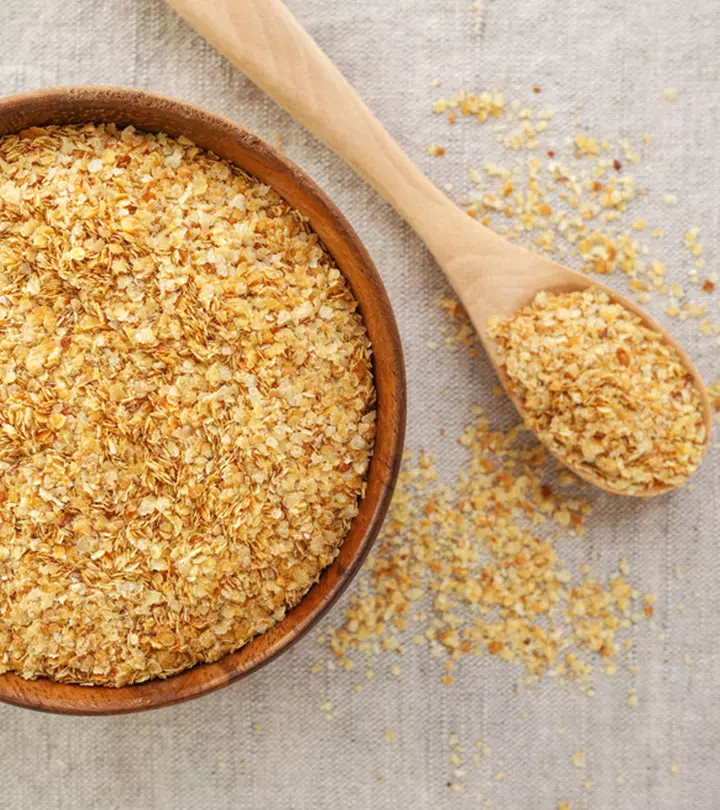
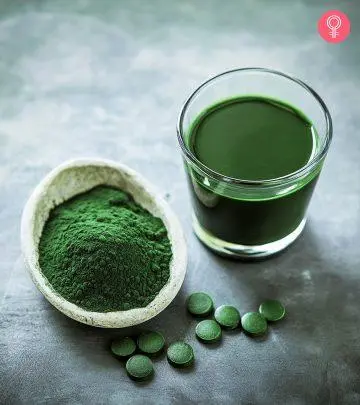
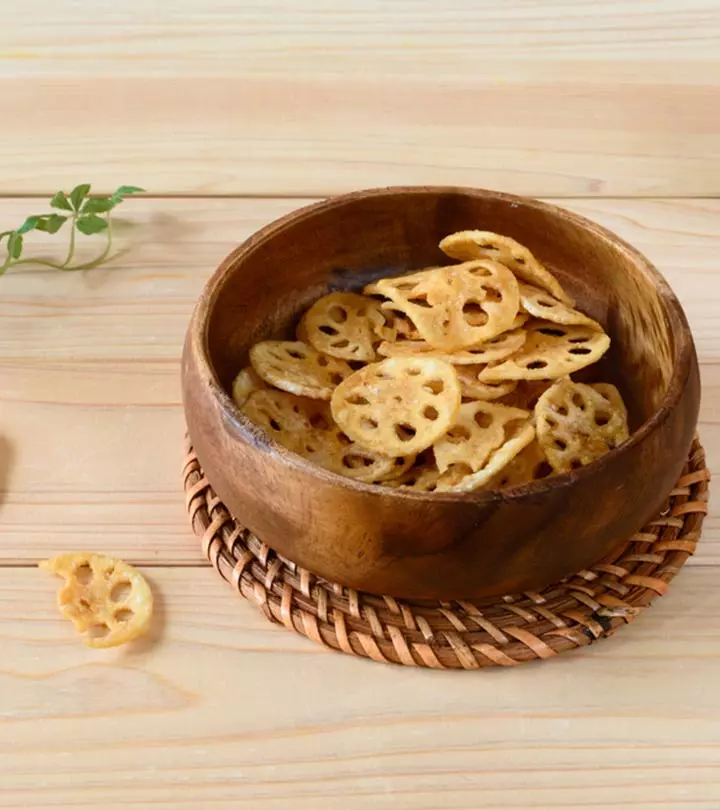

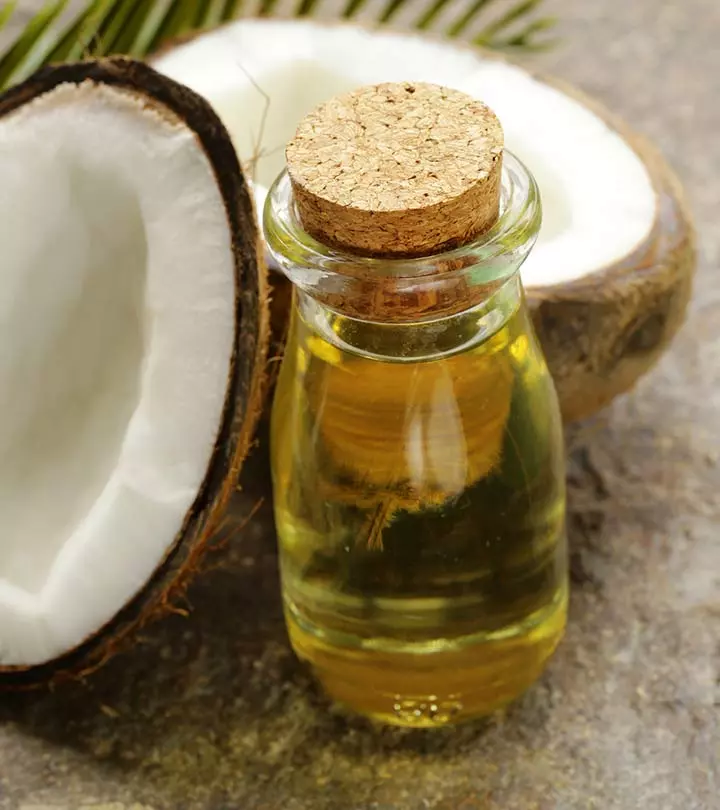
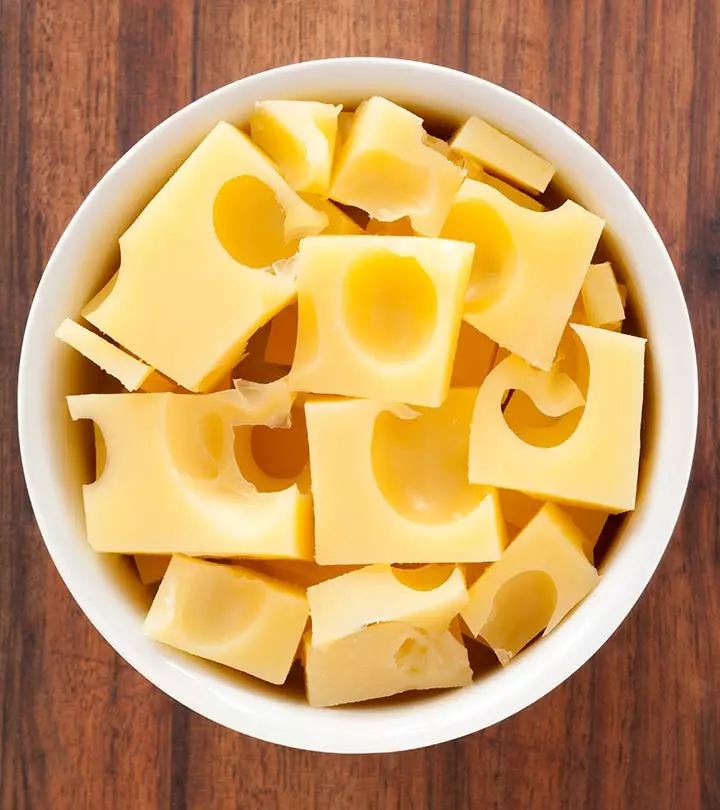
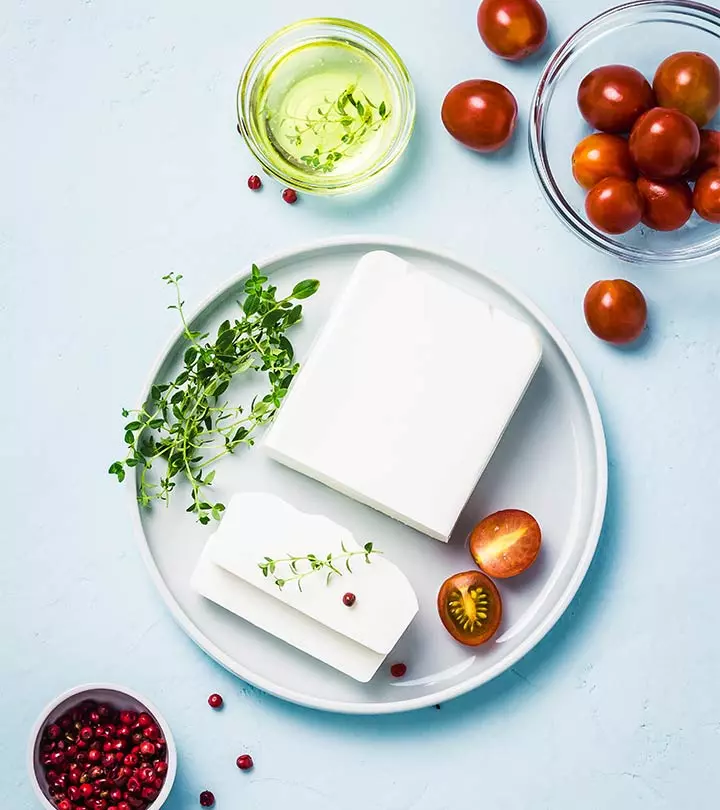



Community Experiences
Join the conversation and become a part of our empowering community! Share your stories, experiences, and insights to connect with other beauty, lifestyle, and health enthusiasts.